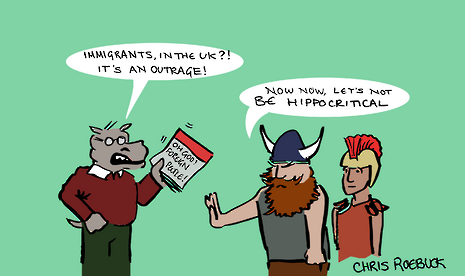From Romania with Love
Roxana Antohi knows that Romanians don’t come here to steal our jobs and scrounge off the state; they love this country

I left Romania, my home country, three and a half years ago. I’d never felt at ease there. Sometimes, you’re born in a place where you simply don’t belong and the feeling lingers with you for an entire lifetime. I was lucky enough to find my true home by accident. I’d always been fascinated by the United Kingdom – or, more precisely, by the mythical image in Eastern perception of a country with foggy streets, black cabs and never-ending rain.
But when I boarded the plane, aged 18, ready to make my way into the world, ready to break the boundaries that society tried so hard to impose upon me, I had no idea what to expect. I left behind people telling me that I was crazy, that I was going to fail, and took the leap, alone. For the majority of my life I’d lived in a closed-off culture, where outside influences rarely made an appearance.Yet here I was, breathing multi-culturalism. Asian, Middle-Eastern, Indian, African-Caribbean and European – all these incredible cultures interplayed with each other in a dance that took place on the background of the charming British landscape.
History that I hadn’t learnt in school, food that made my taste buds burst with joy – so many things about the country made me love it. The people, who I’d expected to be cold and glum, shared the most wonderful sense of humour – self-deprecating, caustic and deadpan, and it caught me off guard every time. I fit right in. I even liked the eccentricity of the British weather.
As years went by, my relationship with the country grew stronger. I got to know it better, learn its faults, and loved it still. I identified more with it than I’d ever done back home. After a while, every time someone asked me where I was from, I wanted to scream desperately “From here!” but couldn’t. I had a Romanian passport (and accent), after all.
My view wasn’t shared by the British officials. Trying to get a student work permit that allowed me to work during holidays to pay my college bill was like hitting my head against a wall. The waiting time for the permit was around a year and one of its requirements was getting expensive private healthcare, so I never got it.
I was lucky enough to get a very generous bursary from my college, which allowed me to pay for living costs, but some of the people I knew at other universities had to drop out because of the costs involved.
My relationship with this country changed in 2013 – the year when I unwittingly became a member of one of the Daily Mail’s most hated groups: a Romanian immigrant. Not that I hadn’t been one before – it’s just that I had felt like I blended in with the cultural mix that I’d encountered here. All of a sudden I was swept up in a hurricane of vile rhetoric, fuelled by the press and politicians.
What furthered my confusion was the thought that I had been in the eye of the storm all along, blissfully unaware of the pent-up anger that British citizens had felt towards us. Or had they?
Polls suggested that 56 per cent of British people wanted immigration to be cut – but 47 per cent of them thought that immigration was bad for the economy. Had their opinion been influenced by the headlines – and were they right to believe them?
Most research shows EU immigrants actually boost the British economy- they are far more likely to come to the UK for work than to claim benefits. As such, they pay in far more than they take out. As for stealing people’s jobs and creating unemployment in the British population, studies suggest that, overall, migration has no impact on UK-born unemployment. The truth made me sad, in that it was so far from the anti-immigration rhetoric sprawled across headlines and regurgitated by populist politicians, who I’d expected to at least do their own research before condemning whole nations for the sake of a few votes.
Feelings in the Romanian community were equally mixed. The expats I knew, ranging from Cambridge students to car-washers, were insulted at the idea of being called scroungers for no good reason, and confused by how differently their day to day experiences with Brits were, when compared to the inflammatory headlines.
They’d made friends with the natives, exchanged cultural impressions, shared jokes and lived together. Of course they’d found people who were against immigration – but when it came to their daily lives, they were all people working for their families, all members of the same community.
In Romania, the reaction was a mix of increased outrage at the idea of Romanians being so belittled in Britain, and genuine concern for the ‘poor British people’ having to deal with an avalanche of Romanian natives invading their island. Populist rhetoric had been carried over into Romanian press without anyone looking at the actual facts. A domino effect had swept across the continent – and few knew what the truth behind the headlines actually was.
When 1st January came, the tidal wave of Romanian immigrants failed to materialise. When midnight struck on New Year’s Eve, I didn’t have one egg thrown at me – instead, I received texts from my British friends welcoming me to the UK ‘for real this time’. A new year found me loving this country just as much, despite the bitter memories of Romanian-slaying headlines. Brits and Romanians – and immigrants of countless other nationalities – continued to live together.
Everyone is now much more aware of the immigration issue, but many questions need answering still. But things like this take time. I just hope that, as time goes on, fewer eyebrows will be raised at the idea of Romanians, like me, living in the UK.
 News / ‘Out of the Ordinary’ festival takes over Cambridge 26 August 2025
News / ‘Out of the Ordinary’ festival takes over Cambridge 26 August 2025 News / Council rejects Wolfson’s planned expansion28 August 2025
News / Council rejects Wolfson’s planned expansion28 August 2025 Comment / Who could possibly want more exams?25 August 2025
Comment / Who could possibly want more exams?25 August 2025 News / Tompkins Table 2025: Trinity widens gap on Christ’s19 August 2025
News / Tompkins Table 2025: Trinity widens gap on Christ’s19 August 2025 Sport / Return to your childhood sport! 29 August 2025
Sport / Return to your childhood sport! 29 August 2025









